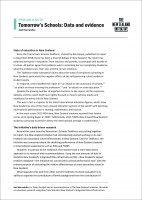
Bungled census jeopardises evidence-based policy
In a letter to a select committee last week, Liz MacPherson, chief statistician of Statistics New Zealand (SNZ), said about 240,000 individuals had only partially completed the 2018 census. This, on top of the 480,000 individuals who did not complete the census at all, increased the census data gap to more than 700,000 individuals (or 14.3 per cent of the population). Read more




















